Nicola Sturgeon rules out coalition after 'emphatic' win for SNP
- Published
SNP leader Nicola Sturgeon has spoken of an "emphatic" victory for her party in the Scottish Parliament elections. Speaking outside the first minister's official residence at Bute House in Edinburgh, she ruled out seeking a formal arrangement with other parties.
SNP leader Nicola Sturgeon has ruled out coalition talks after falling two seats short of an overall majority in the 2016 Holyrood election.
She said the SNP's haul of 63 seats gave "a clear and unequivocal mandate" to govern as a minority administration.
The Conservatives came second with 31 seats. Leader Ruth Davidson said the SNP had no case for another referendum.
Labour slumped to third place with 24 seats followed by the Scottish Greens on six and Liberal Democrats on five.
Speaking in Edinburgh following the SNP's victory, Ms Sturgeon said "the SNP made history" by becoming "the first party to win a third consecutive Scottish Parliament election".
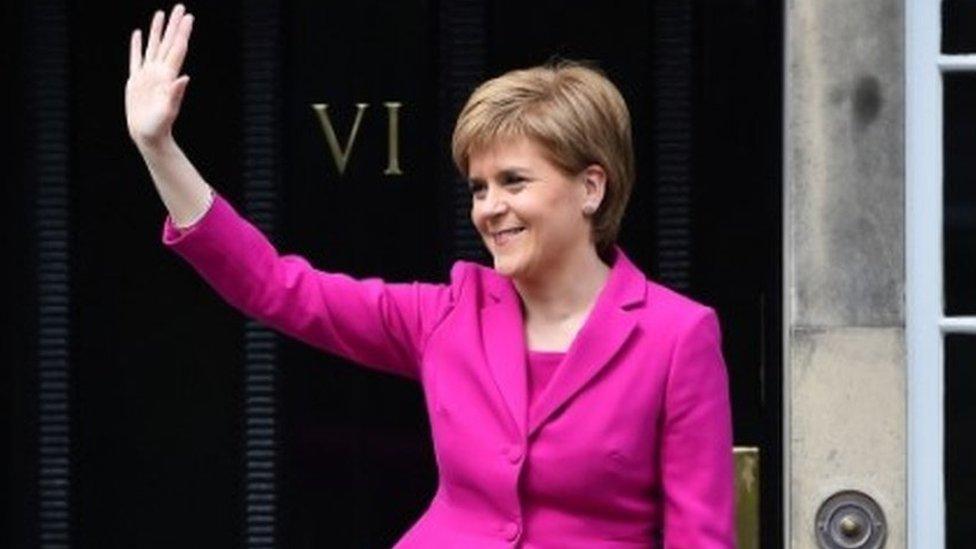
Nicola Sturgeon said the SNP would govern alone and seek consensus with other parties
She said: "We won the highest share of the constituency vote and the largest number of constituency seats ever achieved in a Scottish Parliament election.
"And we are the first party in the era of devolution to poll more than one million votes in constituencies across the country.
"The result of the election was emphatic...we won a clear and unequivocal mandate."

Some of the main headlines from the night:
Former Labour leader Johann Lamont loses Glasgow Pollok seat to SNP's Humza Yousaf
Former Scottish Labour leadership candidate Ken Macintosh loses Eastwood seat to Conservatives
Former Scottish Labour leader Iain Gray held off SNP challenge in East Lothian
Labour's Jackie Baillie held her Dumbarton seat by just 109 votes
The Conservatives take three of the four constituencies seats in Dumfries and Galloway and the Scottish Borders
Ross Greer becomes the youngest ever MSP after being elected for the Scottish Greens

Ms Sturgeon said she had secured a "personal mandate" and would seek formal re-election as First Minister when the parliament reconvenes.
She added: "It will then be my intention to form and to lead an SNP government.
"With such a large number of MSPs elected I do not intend to seek any formal arrangement with any other party."
The SNP leader said she would lead an "inclusive" government and "reach out and seek to work with others across the parliament to find common ground and build consensus".

Party vote share by constituency
Your browser does not support this interactive content

With the Conservatives now the largest opposition party at Holyrood, Ms Davidson used her post-election address to call on the SNP to rule out another referendum on independence.
Speaking in Edinburgh, she said: "As I said during the election campaign, the SNP manifesto does not give Nicola Sturgeon a mandate for a second independence referendum.
"Now that she has failed to win a majority, whatever claims the SNP were pursuing with regard to constitutional brinkmanship over the next five years have now been utterly shredded.
"No mandate, no majority, no cause - the SNP must now let Scotland move on."
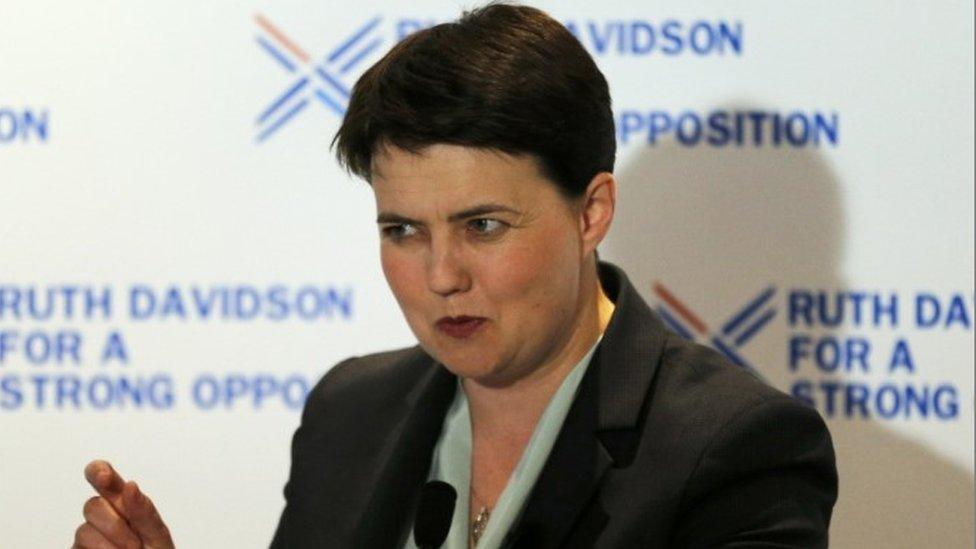
Ruth Davidson addressed supporters after steering the Conservatives to second place
Ms Davidson said she was "very, very proud" that the Conservatives had recorded their best-ever Holyrood result by securing 31 MSPs to overtake Labour.
Their previous best result was 18 MSPs, a total the party achieved in both 1999 and 2003.
Liberal Democrat leader Willie Rennie also said the SNP must ditch the prospect of another independence referendum if they hoped to attract support from his party.
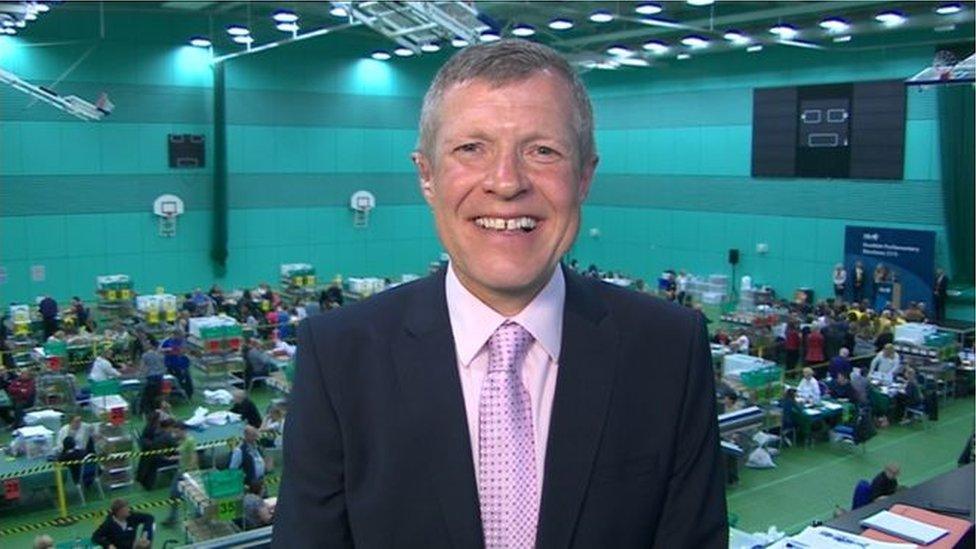
Liberal Democrat leader Willie Rennie won Fife North East from the SNP
Speaking after the Lib Dems secured five seats - unchanged from 2011 - he said: "They have got to make a clear and unambiguous statement that another referendum must be off the table for the next five years in order to respect the referendum result.
"That's what they need to go just to get over the starting line and I think it's going to be pretty hard for them, but that's what they'll need to do in order to make sure that we can work in partnership."
'Heartbreaking result'
Meanwhile, Scottish Labour leader Kezia Dugdale has written to party members saying they "must continue to fight for what we believe in" despite a "heartbreaking" result in the Holyrood election.
Labour finished third with 24 seats - down 13 from 2011 - its worst-ever result in the Scottish Parliament vote.
In an email, Ms Dugdale said the need for a party arguing for "using the power of government to invest in people" was more important than ever.
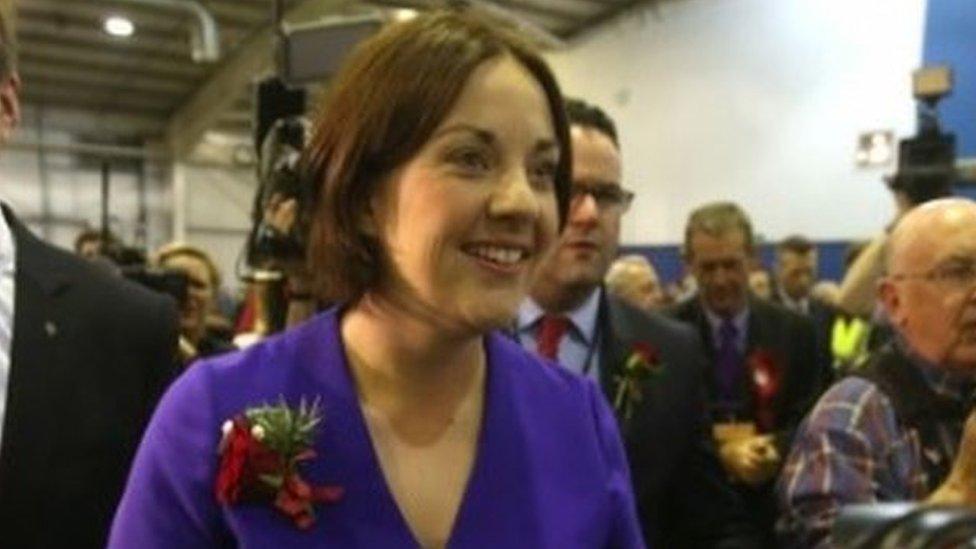
Kezia Dugdale said she was "heartbroken" at Labour's collapse in Scotland
She wrote: "We could have fought an election that was about the arguments of two years ago but we chose to stand up for what we believe in.
"We will keep standing for our belief that we can choose to be better than this. Despite the disappointment of the final results, hundreds of thousands of our fellow citizens stood with us.
"I'll keep fighting for our values."
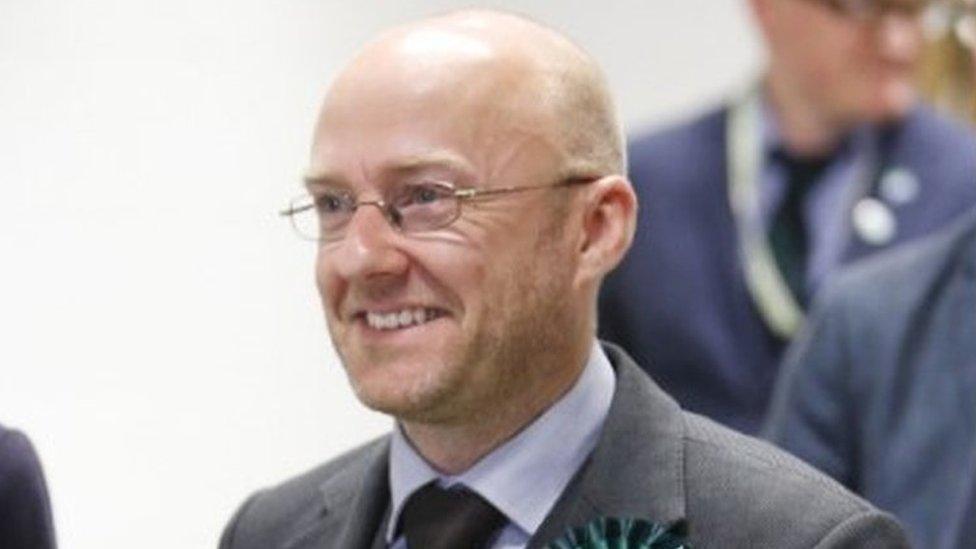
Scottish Greens co-convener Patrick Harvie has pledged to offer "constructive" opposition
Scottish Greens co-convener Patrick Harvie hailed his party's success after it trebled the number of MSPs from two to six and beat the Liberal Democrats into fifth place.
"It's clear with the continued decline of Labour and the lack of an overall SNP majority that we have an opportunity to increase our influence in the next parliament," he said.
"Greens have already proved ourselves to be a constructive yet challenging opposition group, delivering results on housing, fracking, fuel poverty and fan ownership of football clubs among many other issues."

Analysis by Sarah Smith, Scotland editor
For Scottish Labour, arguments over their manifesto or personalities are to miss the point. This election was clearly about the constitution.
Scottish politics are still totally dominated by the independence question which was certainly not settled on 18 September 2014 and still seems to take precedence in voters' minds over any other issue.
And it's an issue on which Labour cannot win.
So where does that leave Labour?
If the SNP are the party of independence and the Tories the party of the union, what is the point of the Labour Party?
They will continue to argue that they care most about social justice and poverty. But as long as voters remain split over the constitution that may not win back many voters.

Scotland's Additional Member System sees 73 constituency MSPs elected through first-past-the-post and 56 regional MSPs elected, from eight electoral regions, through a form of proportional representation.
The SNP dominated the constituency vote taking 59 of the 73 seats - an increase of six on the 2011 election.
The Conservatives won seven, four up on last time, and the Liberal Democrats took four, an increase of two. The big loser was Labour which won three seats - down 12.
The SNP's dominance was not reflected in the proportional regional system.
The SNP has four regional MSPs - down 12; the Conservatives have 24, up 12; Labour was down one, to 21; the Scottish Greens have six, up four; and the Liberal Democrats won one regional seat, down two on their previous result.

The constituency seats which changed hands
Aberdeenshire West: Conservative (was SNP)
Coatbridge & Chryston: SNP (was Labour)
Cowdenbeath: SNP (was Labour)
Dumfriesshire: Conservative (was Labour)
Eastwood: Conservative (was Labour)
Edinburgh Central: Conservative (was SNP)
Edinburgh Northern & Leith: SNP (was Labour)
Edinburgh Southern: Labour (was SNP)
Edinburgh Western: Liberal Democrat (was SNP)
Fife North East: Liberal Democrat (was SNP)
Glasgow Maryhill & Springburn: SNP (was Labour)
Glasgow Pollok: SNP (was Labour)
Glasgow Provan: SNP (was Labour)
Greenock & Inverclyde: SNP (was Labour)
Motherwell & Wishaw: SNP (was Labour)
Renfrewshire South: SNP (was Labour)
Rutherglen: SNP (was Labour)
Uddingston & Bellshill: SNP (was Labour)
The gains and losses
The SNP won 11 - all from Labour. It lost five seats - two each to the Conservatives and Liberal Democrats and one to Labour
The Conservatives won four - two each from Labour and the SNP
Labour won one seat from the SNP and lost 13 - 11 to the SNP and two to the Conservatives
The Liberal Democrats won two seats from the SNP
